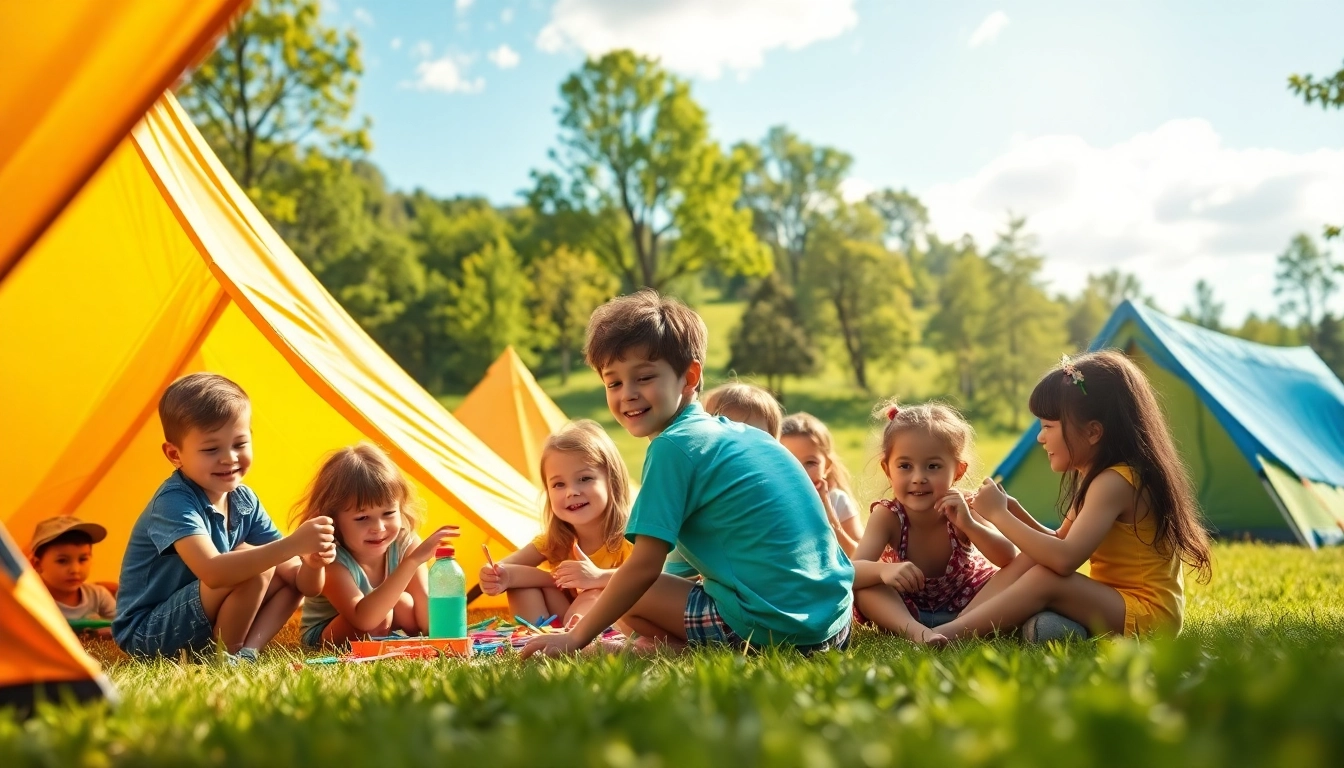What Are Holiday Camps?
Definition of Holiday Camps
Holiday camps are organized programs designed to provide children with a variety of activities and experiences during school breaks. Typically held during summer or holiday periods, these camps can vary significantly in duration, from a few days to several weeks. They serve as a unique environment where children can learn, play, and interact with peers outside of their usual academic settings. By focusing on recreational, educational, and social activities, holiday camps create a space for personal development and fun.
Benefits of Holiday Camps for Children
Participating in holiday camps can offer numerous benefits for children:
- Social Skills Development: Camps encourage children to engage with their peers, helping them build friendships and improve their interpersonal skills.
- Independence: Being away from home fosters self-reliance and confidence as children navigate new environments without their parents.
- Skill Acquisition: Many camps focus on specific activities—ranging from sports to arts and crafts—allowing children to develop new skills or enhance existing ones.
- Physical Activity: With various outdoor adventures, children get the opportunity to exercise and stay active, promoting health and well-being.
- Creative Expression: Camps often offer creative programs, giving children a platform to explore their artistic talents and express themselves.
Types of Holiday Camps Available
Holiday camps come in various forms, each catering to different interests and age groups. Here are the primary types:
- Adventure Camps: Focus on outdoor activities such as hiking, rock climbing, and kayaking, targeting thrill-seeking participants.
- Sports Camps: Designed for young athletes, these camps usually specialize in particular sports and emphasize teamwork, skill development, and competition.
- Art and Music Camps: Foster creativity through a variety of artistic avenues, including painting, drawing, music, and performing arts.
- Academic Camps: Target educational growth and often focus on subjects like mathematics, science, or language arts, combining fun with learning.
- Special Interest Camps: Address unique interests such as technology, programming, or even culinary arts, perfect for children with particular passions.
Choosing the Right Holiday Camps
Factors to Consider When Selecting
When selecting a holiday camp for your child, several factors play a crucial role:
- Age and Developmental Stage: Ensure the camp’s activities are suitable for your child’s age and developmental level.
- Interests and Preferences: Match the camp’s focus with what your child enjoys to enhance their engagement and enjoyment.
- Location: Consider proximity to home. Camps that are too far can add unnecessary stress for both parents and children.
- Safety and Accreditation: Verify that the camp meets safety standards and is accredited or recognized by reputable organizations.
- Cost: Evaluate your budget against the camp’s pricing structure, ensuring you understand what is included in the fees.
How to Match Camps with Your Child’s Interests
Identifying your child’s interests is fundamental when choosing a camp. Start by discussing their hobbies and the activities they enjoy. Ask questions about subjects they’re excited about, whether it’s sports, arts, or science. Conduct joint research by looking into different camps and programs together. Involve them in the decision-making process to create a sense of ownership and enthusiasm about attending their selected camp. Additionally, consider seeking recommendations from other parents or reading online reviews to ensure the camp aligns with your child’s preferences.
Safety Features in Holiday Camps
Safety should be a top priority when choosing a camp. Look for camps that implement stringent safety protocols, including:
- Trained Staff: Camp leaders and counselors should have proper training in first aid, CPR, and emergency response.
- Supervision Ratios: A low adult-to-child ratio ensures adequate supervision, allowing staff to provide personalized attention.
- Secure Facilities: Check that the camp has secure buildings, grounds, and transportation to protect children from outside threats.
- Health Policies: Camps should have clear protocols regarding health emergencies, allergies, and medication administration.
- Emergency Preparedness: A comprehensive emergency plan should be in place, including evacuation strategies and communication plans with parents.
Activities Offered at Holiday Camps
Outdoor Adventure Activities
Outdoor adventure activities are a staple of many holiday camps, offering children the chance to connect with nature, build teamwork, and engage in thrilling experiences. Examples include:
- Hiking: Trail hikes can introduce campers to local wildlife and ecosystems while promoting physical fitness.
- Rock Climbing: Climbing provides both physical challenge and personal achievement as campers conquer heights.
- Canoeing and Kayaking: Water sports help develop balance, strength, and coordination while teaching essential safety skills.
- Zip-lining: This exhilarating activity provides a rush while fostering bravery and trust in equipment and staff.
- Nature Workshops: These educational sessions often focus on wildlife, plants, and the environment, integrating learning with outdoor experiences.
Creative Arts and Crafts Programs
Creative arts and crafts programs allow children to explore their imagination and express themselves artistically. Holiday camps often include:
- Painting and Drawing: Camps provide opportunities to explore various art mediums and techniques, often leading to take-home projects.
- Crafts: Projects can range from DIY items to more intricate designs, often incorporating recycled materials to foster sustainability awareness.
- Performing Arts: Drama, music, and dance classes help children develop confidence and public speaking skills while encouraging collaboration.
- Photography: Workshops teaching basic techniques can ignite a lifelong passion for capturing imagery and storytelling.
Sports and Team-Building Exercises
Sports and team-building activities are vital components of many holiday camps, providing a platform for children to engage in friendly competition and learn essential social skills. Activities may include:
- Team Sports: Traditional sports like soccer, basketball, and volleyball promote cooperation, discipline, and physical health.
- Relay Races and Obstacle Courses: These activities enhance teamwork and improve agility while injecting fun and exhilaration into learning.
- Leadership Games: Structured games designed to encourage leadership and communication skills are often used to build trust among participants.
Preparing Your Child for Holiday Camps
What to Pack for Holiday Camps
Packing for a holiday camp can be both exciting and daunting. Here’s a comprehensive list to ensure your child is fully equipped:
- Clothing: Weather-appropriate clothing and layers, including rain gear and swimwear for water activities.
- Footwear: Sturdy shoes for hiking and play, as well as sandals for swimming or relaxing.
- Toiletries: Essentials such as toothbrush, toothpaste, soap, sunscreen, and insect repellent.
- Personal Items: A journal, books, or games for leisure time, as well as any medications or comfort items.
- Camping Gear: If the camp includes overnight stays, necessities may include a sleeping bag, pillow, and flashlight.
Emotional Readiness and Communication
Emotional readiness plays a crucial role in ensuring a successful camp experience. Before camp starts, discuss what your child can expect, addressing any concerns they may have about separation from home. Encourage open communication, and let them express any feelings of anxiety or excitement. Role-play scenarios together to prepare them for social interactions, and reassure them that it’s completely normal to feel a mix of emotions about the experience ahead.
Setting Expectations with Your Child
Setting reasonable expectations is essential for a positive holiday camp experience. Have a candid conversation with your child about what the camp entails and what they might experience. Encourage them to set personal goals, such as making new friends or trying a new activity. Clarifying these expectations can help them manage their emotions and foster a growth mindset as they embark on this adventure.
Post-Holiday Camp Reflection
Discussing Experiences and New Skills
Once the camp concludes, take time to discuss your child’s experiences. Ask open-ended questions about what they enjoyed most, the new friendships they formed, and any skills they acquired during their stay. This reflection not only reinforces the child’s learning but also allows parents to share in their excitement. It’s an excellent opportunity for children to build storytelling skills and self-confidence as they recount their adventures.
Keeping In Touch with Friends Made During Holiday Camps
Friendships formed at holiday camps can be some of the most meaningful connections for children. Encourage your child to stay in touch with newfound friends by exchanging contact information or planning post-camp playdates. These connections can provide emotional support and enhance their social network, contributing positively to their self-esteem and personal growth.
Identifying Future Opportunities and Interests
Lastly, holiday camps can be a springboard for future interests. Support your child’s exploration of new activities by enrolling them in local classes or clubs related to what they enjoyed during camp. This continued engagement allows them to deepen their skills and passions, further enhancing their development in a nurturing environment.



